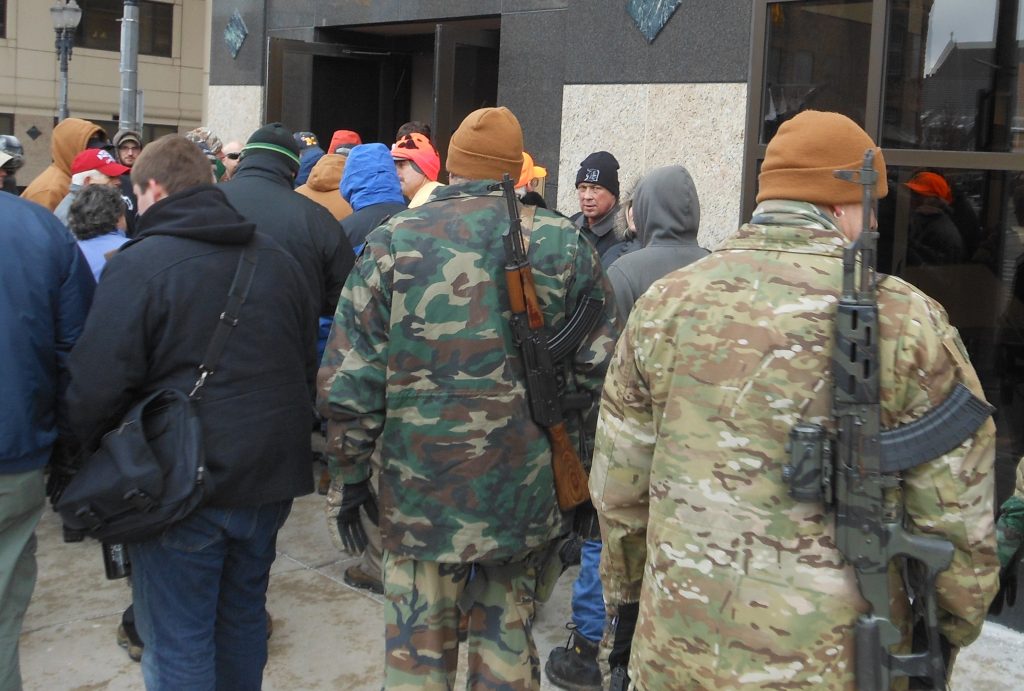“Militias,” “Domestic Terrorism,” and Why The Language We Use Is Important
There’s debate about what to call groups accused in a foiled plot to kidnap, possibly murder Gov. Whitmer.

Michigan’s militia culture has been brought into focus recently. People involved in that culture, including members of the so-called Wolverine Watchmen, are accused by state and federal authorities of plotting to kidnap Gov. Gretchen Whitmer, possibly murder her, and storm the state Capitol with lethal force in an attempt to help incite a new civil war.
But what do we mean when we say “militia”? And when should we actually be calling something “domestic terrorism”?
As part of the weekly series MichMash, MLive’s Cheyna Roth and public radio station WDET’s Jake Neher talk with Peter Trumbore, professor and chair of the Department of Political Science at Oakland University, about the ways we talk about these groups, and why the words we use to describe them matter.
Subscribe to MichMash on iTunes, Spotify, Google Podcasts, NPR One, or wherever you get your podcasts.
The main words being used in the conversation about the alleged plot are “militia” and “terrorism,” specifically “domestic terrorism.” Early on, Gov. Whitmer said the accused members of the plot should not be referred to as militia members, but rather domestic terrorists. Trumbore, whose expertise is in terrorism and Michigan’s militia movement, says it’s important to use each word in the proper context.
“Terrorism is all about action,” he says.
“A militia tells you a little bit about what they might believe, what might motivate them. It also tells you a little bit about what their likely organization and capabilities are. So when you have both words in the discussion, it really, to sort of quote another security analyst, tells you what flavor of terrorist these suspected terrorists were.”
“You had a group of white men who were accused of plotting some extreme, politically motivated violence. And the initial reporting was describing them as militia members. That reporting was accurate. What it wasn’t doing at the outset was saying that what they were planning to do was to carry out acts of terrorism.” Peter Trumbore, Oakland University.
Trumbore says the language we use in these types of situations matters because it shapes the public perception of how great the risk is.
One confounding variable of word choice is the media and public’s tendency to allow race to play a factor in the words used when they shouldn’t. According to Trumbore, “One of the things that we that we see if we look at the evidence is that when minorities, in particular, in this country, Muslims, perpetrate acts of terrorism, the media almost immediately describes them and defines them as terrorists,” he says. “When we see white folks engaging in political violence, they typically get referred to as extremists, or as lone shooters or mass shooters.”
Trumbore says doing this doesn’t convey what the action is or the level of danger. But our society tends not to refer to right-wing political violence in the United States as terrorism, even though it is.
“Any time you have politically motivated violence, or politically motivated threats of violence, you’re talking about terrorism, regardless of the color of the of the suspects, or perpetrators skin, or their religious beliefs or their ideologies.” – Peter Trumbore, Oakland University.
“I think that’s where the pushback came here. You had a group of white men who were accused of plotting some extreme, politically motivated violence. And the initial reporting was describing them as militia members. That reporting was accurate. What it wasn’t doing at the outset was saying that what they were planning to do was to carry out acts of terrorism.”
More From MichMash:
Three Pieces of Advice to Make Sure Your Vote Counts This November
How one Michigan business is thinking ahead for winter during COVID-19
Racial reckoning at Michigan’s art museums
President Trump’s uneven track record with the Great Lakes has environmentalists worried
Trusted, accurate, up-to-date
WDET is here to keep you informed on essential information, news and resources related to COVID-19.
This is a stressful, insecure time for many. So it’s more important than ever for you, our listeners and readers, who are able to donate to keep supporting WDET’s mission. Please make a gift today.
